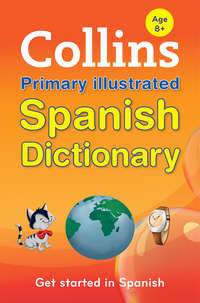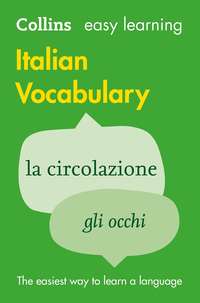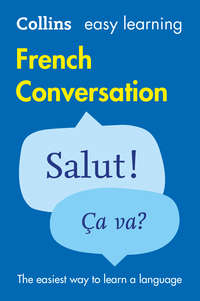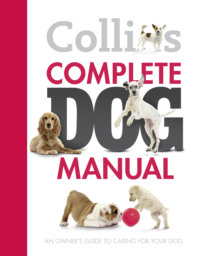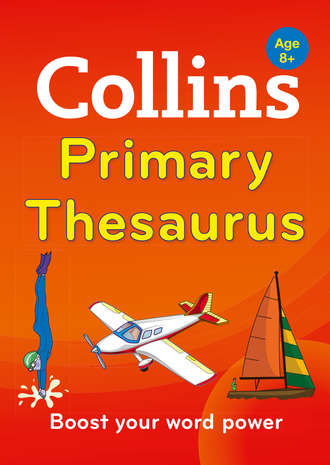
Полная версия
Collins Primary Thesaurus
opposed to
I was opposed to the idea of moving house.
versus
In our playground game, it was Rachel and me versus the rest of the class.

aim (1) VERB
If you aim to do something, you are planning to do it.
intend
One day, I intend to own a chocolate factory.
mean
The player meant to hit the ball down the line, but it flew into the crowd.
plan
Dad had planned to work abroad, but then he was offered a job in Britain.
propose
Mr Potter proposes to put on a school play this year.
set your sights on
Louis had set his sights on becoming an artist, but became a photographer instead.
aim (2) NOUN
Your aim is what you intend to achieve.
goal
Cassandra’s goal is to make a million dollars before she is 25.
object
The object of the game is to throw the ball in your opponents’ basket.
objective
“Men,” barked the Major, “our objective is to cross that river before the enemy sees us.”
purpose
The purpose of the meeting was to decide what our class would do for the school concert.
target
The target for this year’s bring-and-buy sale is to raise a thousand pounds.
aircraft NOUN
An aircraft is any vehicle that can fly.
Types of aircraft:
aeroplane
glider
hang-glider
helicopter
hot-air balloon
microlite
alike ADJECTIVE
Things that are alike are very similar in some way.
comparable
The two boys had had comparable experiences at primary school.
identical
The twins were identical except for the way they styled their hair.
indistinguishable
The forgery and the original painting were indistinguishable.
similar
Phoebe’s house is like ours, and Justin’s is similar too.
ANTONYMS: different or unlike
all right (1) ADJECTIVE
If something is all right, it is satisfactory, but not especially good.
acceptable
Your work is acceptable, Watts, but by no means outstanding.
adequate
The nurse thought her temporary bandage would be adequate to stop the bleeding.
average
“My exam marks were average, but I’m sure I can do better,” said Ron.
fair
Leo made a fair attempt at the test, considering he had felt so ill earlier.
satisfactory
The car was in a satisfactory condition to pass the safety test.
all right (2) ADJECTIVE
If someone is all right, they are safe and not harmed.
safe
“You’ll be quite safe provided that you wait here,” the police officer said.
unharmed
After getting lost in the hills, the boys were returned unharmed to their parents.
unhurt
The stunt rider escaped unhurt after his bike cartwheeled into the air.
uninjured
I was shaken but uninjured after falling during the race.
almost ADVERB
Almost can mean very nearly.
just about
We were just about ready to go, when Mum’s phone bleeped.
nearly
It was nearly five years since Hanif had seen his aunt and uncle.
not quite
I had not quite finished the test when Mr Halliday said the time was up.
practically
Practically all the sandwiches had been eaten.
virtually
Despite having virtually no time to practise, Darius played the piano piece perfectly.
alone (1) ADJECTIVE
Someone or something that is alone is not with other people or things.
detached
The elephant was detached from the herd.
isolated
The old man lived in a cottage on the cliff top. He felt quite isolated.
solitary
Robinson Crusoe was solitary on his desert island home.
alone (2) ADVERB
Something that happens alone, happens without other people or things.
independently
Sian did her homework independently.
separately
The teachers came with us on the bus, except for the head who came later, separately.
solo INFORMAL
The pilot now flew solo for the first time.
also ADVERB
Also can mean in addition to something that has just been mentioned.
as well
Mum had just bought the lettuce when she remembered to get some tomatoes as well.
besides
The competition winner received a sports bag, and a signed bat to go in it besides.
furthermore FORMAL
“You’ve worked well,” the teacher said, “and furthermore you’ve worked quietly.”
in addition
My prize was free tickets to the show. In addition, it included a meal afterwards.
moreover FORMAL
It was cold, and moreover it was getting dark.
too
William is nine, and Rina is too.
although CONJUNCTION
Although can mean in spite of the fact that.
even though
Jessica managed to win the marathon, even though she’d had flu earlier that week.
while
While the work on an oil rig is tough, the pay is good.
altogether ADVERB
Altogether can mean in total and is used when talking about amounts.
all told
There were over two thousand people at the show, all told.
everything included
Everything included, the fête raised enough money for the new equipment.
in total
In total, the auction raised well over five thousand pounds.
always (1) ADVERB
Always can mean all the time.
consistently
Andy is consistently the best player on our hockey team.
constantly
We are constantly receiving junk e-mails.
continually
My mum is continually nagging me to keep my room tidy.
continuously
The generator chugged away continuously throughout the night.
invariably
Aissa is invariably late for school.
regularly
Stars are regularly asked for their autographs.
repeatedly
“I’m repeatedly telling you not to speak with your mouth full!” Dad said crossly.
time after time
Time after time, my little brother asked me to play with him.
ANTONYM: never
always (2) ADVERB
Always can mean forever.
endlessly
I shall be endlessly grateful to the woman who saved my life.
forever
“Madam, I am forever in your debt,” the musketeer said as he swept from the room.
perpetually
The Olympic flame burns perpetually.
ANTONYM: never
amazing ADJECTIVE
If something is amazing, it is very surprising.
astonishing
It is astonishing that we breathe, on average, 500 million times in our lives.
astounding
The marathon runner kept up an astounding pace for the whole 26 miles.
breathtaking
Seeing Niagara Falls was a breathtaking experience.
sensational
The show was sensational, with superb music and dancing.
staggering
It is staggering to realize that 60 per cent of our body is water.
among or amongst PREPOSITION
Among or amongst can mean surrounded by.
amid
Workers searched amid the wreckage for any sign of survivors.
amidst
Amidst all the weeds, a single rose bloomed.
in the middle of
In the middle of the herd of cows was a newborn calf.
surrounded by
Mum and I found ourselves surrounded by inquisitive sheep.

amount NOUN
An amount is how much there is of something.
mass
There was a great mass of tadpoles in our garden pond.
quantity
“For sale: a quantity of unused garden tools,” read the advert.
sum
The house was sold for an undisclosed sum of money.
total
Our little sideshow raised quite a total at our school fête.
volume
A huge volume of water cascades over the waterfall every minute.
amphibian NOUN
An amphibian is one of a group of animals that live both on land and in water.
Some amphibians:
frog
newt
salamander
toad
anger NOUN
Anger is the strong feeling you get about something unfair or cruel.
annoyance
You could see the annoyance on the little boy’s face when he couldn’t have any sweets.
fury
Her face purple with fury, the duchess stormed from the room.
indignation
Our dog, Jim, stared in indignation as I ate the last biscuit.
irritation
Sissy stormed out in irritation.
rage
The wizard flew into a rage and instantly turned the king and queen into toads.
temper
In a fit of temper, I flung my sister’s hairbrush into the garden.
wrath Said “roth”
The player incurred the wrath of the referee for committing a foul.
angry ADJECTIVE
Someone who is angry is very annoyed.
annoyed
Mr Danesh was annoyed that Anna hadn’t handed in her homework.
apoplectic
The team manager was apoplectic, dancing with rage when the referee disallowed the goal.
beside yourself with anger
The head teacher was beside herself with anger when the money was stolen.
cross
You could tell Mum was cross. Her forehead had turned red and wrinkly.
displeased
“Smithers, I’m displeased with the poor spelling in this report,” Sir Hector boomed.
enraged
The bull, enraged, came charging, head down, towards the matador.
fuming
Mrs Stevenson was fuming when she realized Peter was absent yet again.
furious
Furious at such a messy piece of work, Mr Ross flung my book back on my desk.
hot under the collar INFORMAL
Many motorists were getting hot under the collar as the traffic jam built up.
indignant
You could see by her face that our terrier, Tess, was indignant that we had left her behind.
infuriated
The stressed commuter was infuriated to find that the train had left seconds earlier.
irate
It made Mrs Mawdsley irate to find the staffroom key missing.
irritated
I was irritated to find that Alex had borrowed my pencil.
livid
Father was livid that I had broken his favourite fishing rod.
outraged
Many townsfolk were outraged that the lovely old cinema was to be torn down.
seething
I knew from his gritted teeth that the boss was seething.
animal NOUN
An animal is any living being that is not a plant.
beast
The thoroughbred horse was a beautiful but temperamental beast.
creature
The platypus is a strange-looking creature.

Types of animal:
amphibian
bird
fish
insect
mammal
reptile
annoy VERB
If someone or something annoys you, they make you angry or impatient.
aggravate
My gran is often aggravated by noisy motorbikes late at night.
bother
“Please don’t bother me now. I’m really very busy,” said Dad.
drive someone up the wall INFORMAL
“Some of these stupid TV adverts drive me up the wall!” said Grandad.
get on someone’s nerves INFORMAL
Mitchi’s whiny voice really gets on my nerves.
harass
Many famous people are harassed by reporters and photographers.
irritate
My mum was irritated by the constant dripping of the tap in the night.
needle INFORMAL
The soccer player tried to needle his opponent by muttering insults.
provoke
My sister provoked me into an argument by saying I was no good at singing.
answer (1) VERB
If you answer someone, you reply to them in speech or writing.
answer back
When spoken to by the judge, the defendant was foolish enough to answer back rudely.
reply
If you receive an invitation, it’s polite to reply promptly.
respond
The captain asked for volunteers, and two crewmen responded.
retort
“I’d love to go to the ball,” said Cinderella. “No chance!” retorted her ugly sister.
return
“Yes, I’d love to come to the theatre,” Genevieve returned.
answer (2) NOUN
An answer is the reply you give when you answer someone.
acknowledgment
The palace sent a brief letter as an acknowledgment to my request.
reaction
The mayor received an angry reaction to his scheme to sell off the sports field.
reply
The salesman rang the door bell, but there was no reply.
response
There was a terrific response to the famine appeal.
retort
“Ouch, that hurt!” I said. “Serves you right!” came the retort.
appear VERB
When something appears, it moves from somewhere you could not see it to somewhere you can see it.
come into sight
A woolly mammoth came into sight, lumbering from behind the rock.
come into view
A triceratops came into view, its serrated back appearing over the ridge.
emerge
Emerging from his bedroom, my lazy brother rubbed his eyes.
loom
The gigantic airship blotted out the sun as it loomed nearer.
➔ See arrive
area (1) NOUN
An area is a particular part of a place, country or the world.
community
We live in a friendly community, with lots going on.
district
It was a poor district, where litter and street crime were a problem.
neighbourhood
In our neighbourhood, everybody helps one another.
region
This region of Italy is famous for its pizzas.
zone
That zone is open only to airport staff.
area (2) NOUN
Area can mean the measurement of a flat surface.
extent
From the top of the tower, Jamie could see the extent of the city.
size
“What size of paper shall I use?” Dani asked.
area (3) NOUN
The area of a piece of ground or surface is the amount of space it covers.
expanse
When Noah looked from his ark, all he saw was a huge expanse of water.
patch INFORMAL
The police officer said he would miss the people in his patch when he retired.
plot
My parents bought a plot of land, hoping to build a house there.
stretch
You can see otters on this stretch of the river.
argue (1) VERB
If you argue with someone about something, you disagree with them about it, sometimes in an angry way.
bicker
My sisters are always bickering at the table.
disagree
Simon and Sanjiv disagreed passionately about which team would win.
fall out
Hazel and I fell out when she broke her promise to keep my secret.
have a difference of opinion
The two neighbours had a difference of opinion over who owned the fence.
have an argument
Dad and Mum had an argument about whose turn it was to get up and see to the baby.
quarrel
Jack and Wilbur quarrelled over land, and their two families have not spoken since.
row Rhymes with “cow”
The couple next door were always rowing. Now they’ve gone we’ll get some peace!
squabble
“Stop squabbling, you two!” Mum said, exasperated. “You’ll both get a turn.”
argue (2) VERB
If you argue that something is true, you give reasons why you think that it is.
assert
The prisoner continues to assert his innocence.
claim
Mervyn claimed he was the lost King of Albania, but nobody believed him.
debate
“I think we’ll be debating this issue forever!” joked Mrs Evans.
hold
Before 1492, many people held that the earth was flat.
maintain
Columbus always maintained that the earth was round, and proceeded to prove it.
put the case
In the debate, Scarlet put the case for hunting and I opposed it.
reason
Mum tried to reason with my little brother, but it was a waste of time.
argument (1) NOUN
An argument is a talk between people who do not agree.
barney INFORMAL
Kayla and I had a bit of a barney, but we soon made up.
difference of opinion
Panna and Liz had a difference of opinion over which team would win.
disagreement
The tennis players had a disagreement about whether the service was in or out.
dispute
The long-running dispute between the two neighbours ended in a court case.
feud
Occasionally, the feud between the Campbell clan and the MacDonald clan erupted into violence.
fight
Two girls in our class got into a fight over a missing purse.
quarrel
The quarrel started when Colin was left out of the team in favour of Barry.
row Rhymes with “cow”
I was upstairs in my room when the row between Dad and Grandad started.
squabble
It was a silly squabble over who would sleep in the top bunk.

argument (2) NOUN
An argument is a point or set of reasons you use to convince people about something.
case
The barrister set out the case for the prosecution.
grounds
The judge decided there were no grounds on which to find the defendant guilty.
reason
Guy Fawkes was asked to give his reasons for wishing to blow up Parliament.
armour NOUN
Armour is special metal clothing that soldiers wore in the past for protection.
Pieces of armour:
breastplate
gauntlet
helmet
visor
army NOUN
An army is a large group of soldiers who are trained to fight on land.

Here are some more words associated with the military, or armed forces:
air force
battalion
brigade
cavalry
commando
company
garrison
legion
marine
navy
paratrooper
platoon
regiment
reinforcements
squad
squadron
around (1) PREPOSITION
You can use around when something is surrounding or encircling a place or object.
on all sides of
On all sides of the camp, a barbed-wire fence rose menacingly towards grim watchtowers.
on every side of
The word “Fragile” was written on every side of the box.
around (2) PREPOSITION
Around can mean at approximately the time or place mentioned.
about
“I’ll meet you at about three o’clock,” Kamilah whispered.
approximately
“The train will be approximately five minutes late,” said the announcer.
in the region of
The government spent in the region of 30 billion pounds on new roads.
roughly
The new garage will be roughly ten metres in length.
around (3) PREPOSITION OR ADVERB
You say around when things are in various places.
all over
Papers were scattered all over Mum’s office.
everywhere
In the wind, fallen leaves flew everywhere.
here and there
“I always find the odd bargain here and there,” said Gran cheerfully.
arrange (1) VERB
If you arrange to do something, or arrange something for someone, you make plans for it or make it possible.
fix
Mr Pearson fixed our soccer game for next Tuesday afternoon.
organize
Mum said she would organize a trip to the zoo during the holidays.
plan
Dad planned a secret birthday surprise for Mum.
prepare
Most good chefs prepare their menu well in advance.
settle
The old lady settled her affairs before she left town.
arrange (2) VERB
If you arrange objects, you set them out in a particular way.
group
For the photograph, all the wedding guests were grouped in front of the hall door.
organize
For the tournament, players were organized into teams of five.
place
The artist carefully placed the objects she was going to paint.
position
Guards were positioned outside the palace.
arrest VERB
If the police arrest someone, they take them to a police station because they believe they may have committed a crime.
capture
A search party captured the escaped prisoner in an isolated shack.
nick INFORMAL
The bloke next door got nicked for burglary the other day.
take someone into custody
Police officers cautioned the suspect and took her into custody.
arrive VERB
When you arrive at a place, you reach it at the end of your journey.
appear
The film star finally appeared, an hour late.
show up INFORMAL
Jeremy showed up just in time.
turn up
“If you turn up late, the coach will have gone,” warned the driver.
ANTONYM: depart
artist NOUN
An artist is a person who draws or paints, or produces other works of art such as novels or music.
Types of artist:
artist
film director
musician
novelist
painter
playwright
poet
potter
sculptor
writer
ashamed ADJECTIVE
If you are ashamed, you feel embarrassed or guilty.
embarrassed
Karen was embarrassed to find that the rain had streaked her make-up.
guilty
I hadn’t done anything, but I still felt guilty about the missing money.
humiliated
Jade felt humiliated after the coach had publicly blamed her for losing the game.
sorry
Misha was sorry that his stupid comment had caused so much upset.
ask (1) VERB
If you ask someone something, you put a question to them.
enquire or inquire
“If you want more information, enquire at the desk over there,” the woman said.
interrogate
Secret police interrogated the spy about his mission, but he told them nothing.
query
Mr Blake queried the bill, saying he’d been overcharged.
question
The suspicious-looking stranger was stopped and questioned about what she was doing.
quiz
My mum quizzed me about where I was going, and who with.
ask (2) VERB
If you ask for something, you say you would like to have it.
appeal
Our church appealed for money to help repair the roof.


